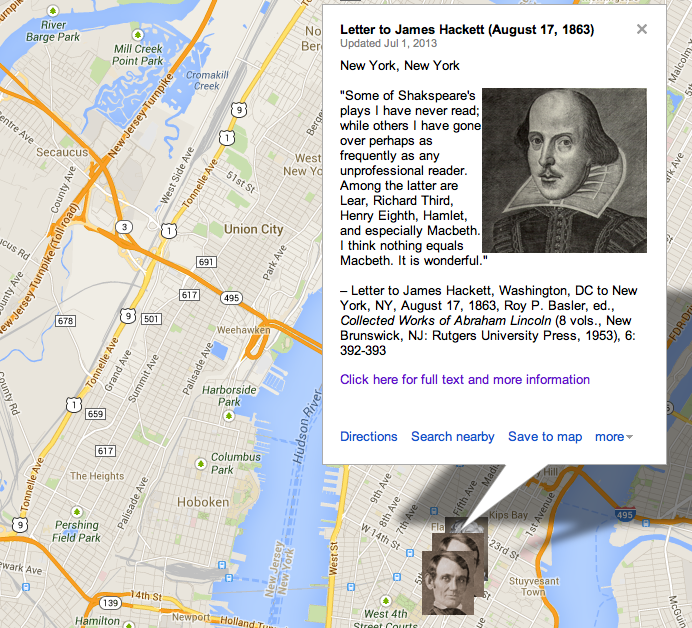Ranking
#131 on the list of 150 Most Teachable Lincoln Documents
Annotated Transcript
On This Date
HD Daily Report, August 17, 1863
The Lincoln Log, August 17, 1863
Custom Map
How Historians Interpret
“Lincoln continued reading Shakespeare well after he left New Salem. The Bard of Avon ‘was his constant companion. He took a copy with him almost always when traveling, and read it at leisure moments.’ He especially liked political figures, including Richard III, Hamlet, Macbeth, Julius Caesar, and Coriolanus. His favorite plays were Hamlet and Macbeth. As president, Lincoln recited soliloquies from Hamlet and Richard III and told an actor that he had read and re-read Shakespeare ‘perhaps as frequently as any unprofessional reader.’”
–Michael Burlingame, Abraham Lincoln: A Life (2 volumes, originally published by Johns Hopkins University Press, 2008) Unedited Manuscript by Chapter, Lincoln Studies Center, Volume 1, Chapter 3 (PDF), 228-229.
“Lincoln also acquired a taste for poetry, especially Burns and Shakespeare; and it is worth remembering in this context that Burns was read in the early nineteenth century as a religious skeptic, while the Shakespeare Lincoln liked best had a strong whiff of fatalism to it. Lincoln’s comment to the actor James Hackett in 1863 that he preferred the king of Denmark’s “soliloquy in Hamlet commencing ‘O, my offence is rank'” to the more celebrated “To be, or not to be,” is usually treated as an embarrassing but amiable example of an amateur’s enthusiasm. Not enough interpreters of Lincoln have taken the trouble to read the soliloquy (act 3, scene 3) and notice that it speaks in agonizing tones about the inability of human beings to choose, on their own, even the most desirable ends:
O, my offense is rank, it smells to heaven …
… what then? what rests?
Try what repentance can: what can it not?
Yet what can it when one can not repent?
O wretched state! O bosom black as death!
O limned soul, that struggling to be free
Art more engaged!”
–Allen C. Guelzo, “Abraham Lincoln and the Doctrine of Necessity,” Journal of the Abraham Lincoln Association 18 no. 1 (1997), 57-81.
“He spent much of his time, for instance, in reading newspapers—not the comprehensive journals of today, but small sheets filled almost entirely with political matter highly colored by the partisan bias of each editor. He was inordinately fond of such humorists as Artemus Ward and Petroleum V. Nasby, frequently reading passages from their writings to the members of his cabinet. In striking contrast was his passion for Shakespeare. Here again his propensity to dig deeply even if narrowly is illustrated. Though he was familiar enough with Hamlet and Macbeth and a few other plays to challenge the interpretations of the foremost Shakesperian actor of the time, he casually confessed that several of the plays he had not even read.”
–Paul M. Angle, “Lincoln’s Power with Words,” Journal of the Abraham Lincoln Association 3, no. 1 (1981): 8-27.
NOTE TO READERS
This page is under construction and will be developed further by students in the new “Understanding Lincoln” online course sponsored by the House Divided Project at Dickinson College and the Gilder Lehrman Institute of American History. To find out more about the course and to see some of our videotaped class sessions, including virtual field trips to Ford’s Theatre and Gettysburg, please visit our Livestream page at http://new.livestream.com/gilderlehrman/lincoln

